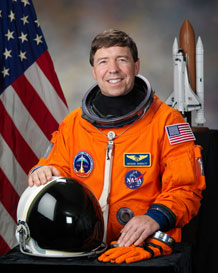Articles

Astronaut Dr Michael Barratt will support the Extreme Medicine teaching team
Astronaut joins Extreme Medicine team
Astronaut, physician and adventurer Dr Michael Barratt has signed up to support the Extreme Medicine teaching team, which will help train doctors on how to practice high-quality Medicine, even in space.
Dr Barratt, who served as a flight surgeon for NASA before being selected as an astronaut, will bring his experience of two missions into space to the joint expertise of programme partners the University of Exeter Medical School and World Extreme Medicine.
The Masters programme will equip healthcare professionals to practice medicine in the world’s most remote and challenging environments, including polar regions, the desert and now the ultimate extreme environment – outer space. Graduates will have the skills to deliver excellent care amidst disaster or on expedition to such extreme remote locations.
Dr Barratt said: “I’m delighted to support this high-quality programme, which seeks to bridge a real gap in knowledge. As advances in technology make the world – and indeed the universe – ever more accessible, it is crucial that we are training professionals who can deliver the same care we would expect in a hospital in other environments, no matter how extreme they are.”
Dr Barratt was selected by NASA in 2000. He is board certified in Internal and Aerospace Medicine, and has participated in two spaceflights. In 2009, Dr Barratt served as Flight Engineer for Expedition 19/20, which flew to the International Space Station. During this time, he performed two spacewalks. This was the final three crew mission, before NASA increased its crew size to six members.
He also flew on STS - 133, when the space shuttle Discovery docked with the International Space Station, which delivered a new storage module to be left permanently docked to the space station. It also delivered the fourth Express Logistics Carrier, which proved the space station with services including electrical power and data handling services.
Currently, Dr Barratt serves in the International Space Station Operations and Integration branches to handle medical issues and support to crews in orbit.
Mark Hannaford, co-founder of World Extreme Medicine, said: “I’m thrilled to welcome Dr Barratt aboard. His expertise and input is a real coup, and contributes to the high quality that our students can expect across a range of disciplines. Who better to advise on extreme medicine than NASA’s own flight surgeon?”
Dr Malcom Hilton, Acute Sub Dean at the University of Exeter Medical School and a Consultant Surgeon, said: “Dr Barratt’s involvement strengthens what is already a high quality programme that is raising the bar for Extreme Medicine education to new heights. This is an incredibly exciting opportunity in a growing field of medical need.”
Sir Ranulph Fiennes, who lives on Exmoor, has also endorsed the Masters, saying: “This programme covers subject matter that is very close to my heart, and is a key element of a movement to bring together the sometimes disparate but overlapping worlds of exploration, humanitarian crises and medicine. It’s medicine that saves the lives of not only the most remote explorer but also populations devastated by natural disasters, covering those most in need in the most vulnerable of places.”
To find out more, visit the MSc Extreme Medicine programme page.
Date: 7 November 2016
